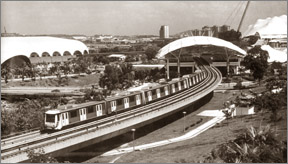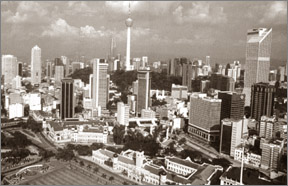Kwickie in Kuala Lumpur
by Vikram Sharma
Though I am not exactly your average globetrotting jet-setter, of the
few places I have travelled to outside of India, I have felt the most at
home in Kuala Lumpur. There are a number of reasons for this comfort
level, which you shall get to know in the course of this narrative.
 Comparing this 'marvel of modern engineering' to IGI Airport, or for
that matter to any other Indian airport, would be akin to comparing the
good old Amby to a BMW - there are no grounds for comparison! Comparing this 'marvel of modern engineering' to IGI Airport, or for
that matter to any other Indian airport, would be akin to comparing the
good old Amby to a BMW - there are no grounds for comparison!
Five levels of marble, glass and aluminium spread over a staggering
10,000 hectares, KLIA is massive, modern and slick, more like a chic
shopping mall than an airport.
Though being greeted by masked cops, doctors and nurses was slightly
unnerving, the SARS inspection was a breeze, and the thirty odd
immigration counters in the arrival hall mean there are never more than
five or six people in a single line. The main terminal houses a variety
of restaurants, cafe and bars along with 67 retail outlets - Christian
Dior, Versace, Gucci, Bally, Barberry...
The city lies 50 kilometres from the airport and there are a number
of options to get to it, so stay away from the friendly looking gents
who approach you as soon as you exit the Arrival Hall.
The most convenient and the most economic of these options is the
KLIA Ekspress, a dedicated manorial service that connects the airport to
KL Sentral Station in the city centre in 28 minutes flat. The train can
be boarded from level three after you've cleared customs - just follow
the coloured lines on the floor.
 If, however, public transport is too lowly for you, get yourself a
'Coupon Taxi' from the pre-paid Airport Limo counter at the Arrival Hall
on Level 3. A cab takes around 50 minutes, more if there's traffic. If, however, public transport is too lowly for you, get yourself a
'Coupon Taxi' from the pre-paid Airport Limo counter at the Arrival Hall
on Level 3. A cab takes around 50 minutes, more if there's traffic.
Being the skinflint that I am, I chose the cheapest way, which, in
retrospect turned out to be the best. The Ekspress is modern mass
transit at its best - clean, fast, economical and eco-friendly. The view
of the KL Skyline from the elevated track is an added bonus.
At KL Sentral Station, get yourself up to the exit on the next level
and get a coupon for a Taxi. The cab ride from KL Sentral to your hotel
will most probably take you through the centre of town.
The 'Central Area', at least that's what my street map calls it,
gives you a glimpse of what the city might have been like before the
high rises took over the skyline. Sprawling greens intersperse old
buildings that have a distinct colonial flavour and lie on either side
of cobbled streets, with natives lounging about on street corners,
enjoying an after dinner smoke in the balmy weather.
I am told that KL has a very vibrant nightlife, but after 12 hours in
economy class, I lacked the energy or the enthusiasm to discover it
myself. Nothing KL had to offer me that right could possibly have
distracted me from my hotel bed. After sleeping like a baby for the
entire right and a good part of the morning, I was ready to hobnob with
the natives and imbibe some local flavour.
For me, the best way to see the sights and get a genuine 'feel' of a
city is on foot, and KL's clean and broad pavements and frequent
pedestrian crossings make it very pedestrian-friendly.
As I only had about four hours till my connection to Delhi and was
adamant on walking, the lady at the hotel's reception handed me a map
and suggested Bintan Walk and Chinatown. So, I loaded up the trusty old
Nikon and set off on my sight seeing tour.
'Jalan Bukit Bintang', better known as the Bintang Walk, was the
first halt on my whistle stop KL tour. Bintang Walk is home to some of
the best hotels and trendiest shops, pubs and cafes in town. Just about
anything your credit card allows is available in one or the other of the
numerous shops that line both sides of the street - clothes, shoes,
toiletries, chocolates, electronic gadgets...
Once you've shopped to your heart's content and burned a big enough
hole in your pocket, turn right at the end of the Walk.
That my map reading skills aren't as good as they should be was
something I realised after walking for fifteen minutes in the wrong
direction. After much trepidation and head scratching, I admitted defeat
and decided to ask for directions.
On scanning the horizon for a likely candidate, I zeroed in on a
friendly looking bloke lounging on his scooter and smoking a cigarette.
"No la, you're going in the wrong direction. Turn around and take a
taxi, China Town's too far to walk la," my friend and guide told me,
'La' by the way, is a term of endearment, much like our 'yaar' that very
frequently rolls off the tongues of Malays of all ages.
I got the distinct notion that Malays are not a people prone to
ambulatory pleasures. Contrary to my guide's advice, I decided to risk
it and continued on foot, the scenery goes by much slower that way.
Though China Town was not close, it did not take me more than twenty
minutes to get there.
Like China Towns all over the world, China Town in KL too must have
been a home away from home for the city's Chinese immigrants. But I saw
very little evidence of people living in KL's China Town, which is now a
thriving bustling, noisy, vibrant and colourful market.
Mouth watering aromas waft through the air from the numerous Chinese
eateries housed in old colonial buildings with all manner of exotic
looking carcasses hanging in their display windows. Peking Duck in Kuala
Lumpur, anyone? I like to think of myself as something of an aficionado
of Chinese food, and KL's China Town was heaven!
The large number of Malays shopping in the market was an encouraging
sign, a healthy indicator that the shops weren't set up with the express
purpose of ripping off clueless tourists.
Another good sign was a Malay woman gesticulating violently with her
hands and having a heated argument with a Chinese shopkeeper. Though I
obviously could not understand a word of the conversation, I could
recognise the subtle gestures and expressions of a haggling session
anywhere in the world.
Having spent many a Saturday afternoon following my mother around
countless markets, I have a solid foundation in this fine art, but
that's a whole different story.
Having seen so many familiar sights, I felt a lot more comfortable
reaching for my wallet here. The produce of choice in China Town seemed
to be wristwatches, miles and miles of them glistening in the afternoon
sun.
Then there are cell phones, cell phone covers and all manner of
electronic knick-knacks. Turn off the electronic alley and you're back
in food heaven, only this time it's colourful and hasn't been trotting,
flying or swimming in a long time.
Fruits and veggies in all colours of the rainbow, most of them alien
to the average Indian, are piled high in roadside stalls topped with
large colourful umbrellas that seem to be competing with the produce for
attention.
Once you've had your fill of exotic China Town, KL Sentral is a
five-minute cab ride away. If you're leaving KL on a Malaysia Airline
flight, you have the option of checking in at the train station, latest
two hours before scheduled departure. If you still have some Ringgits
left once you get to the airport, there are plenty of Duty Free options
to relieve you of them. Enjoy! |
